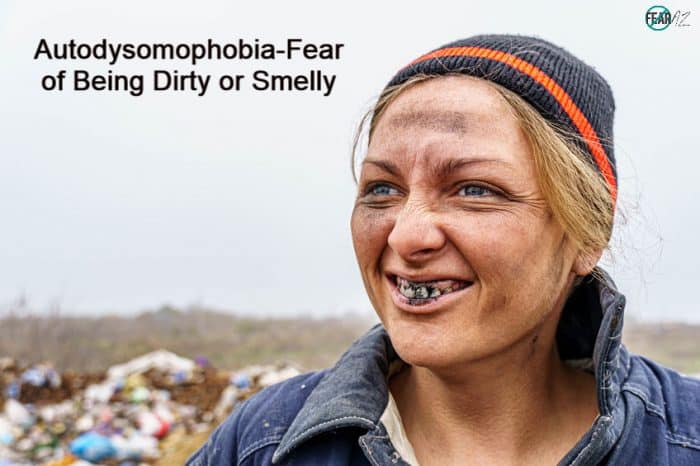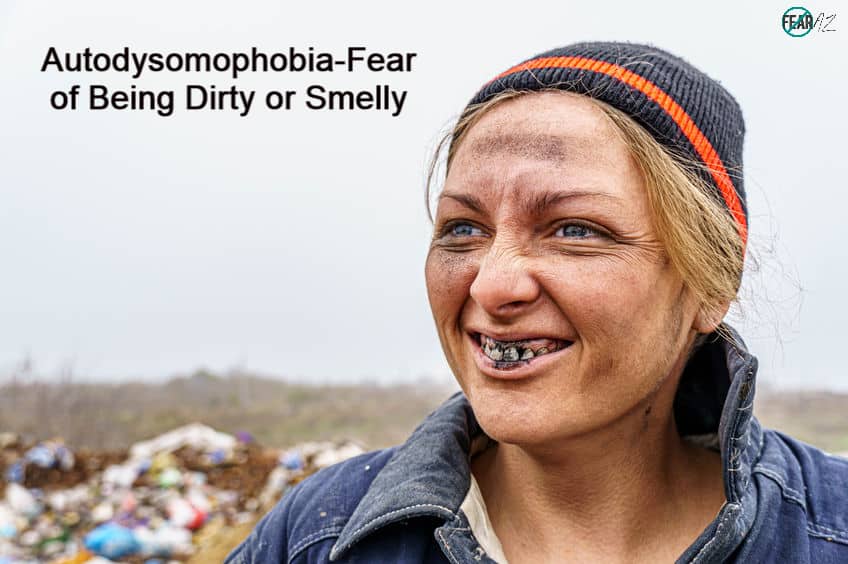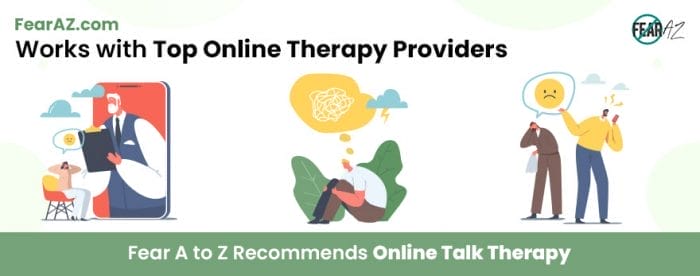Share This Article
The Down and Dirty of Autodysomophobia
Have you ever walked into a job interview and felt overly conscious about the way you smell?
Does the thought of taking your shoes off at a friend’s house make you nervous?
Do you spend hours browsing remedies for body odors? Perhaps you invest in all sorts of perfumed products or take extra-long showers to ensure you don’t have body odor. And despite all that, are you still bothered by the thought that you might smell? Or that you are dirty?
If you can relate to this feeling, you might have autodysomophobia. It’s also likely that you may have bromidrophobia, which is the fear of perceived smells or odors.
Knowledge is power. And fighting this feeling is possible if you have the right tools.
Autodysomophobia Definition
Autodysomophobia is the fear of smelling bad. This obsessive phobia over body odor is sometimes an exaggerated reaction. It could also be a figment of the imagination. An affected individual is convinced that he or she is emitting a vile smell, which leads them to bathe multiple times a day or cut off socializing altogether as a coping mechanism.
Autodysomophobia, a social phobia, is also referred to as olfactory reference syndrome (ORS). Considered to be a sub-type of body dysmorphia, ORS could also be linked with obsessive-compulsive disorder. Stress, isolation, and avoidance may occur with autodysomophobia.

The cause of ORS could be traced to social trauma or heredity. An event from the past can serve as a trigger. Social phobias such as ORS are complex and causes tend to reveal themselves over time. Brain chemistry coupled with experiences of trauma impacts the development of these types of phobias.
What Are the Symptoms of Autodysomophobia?
The symptoms of autodysomophobia are varied. Many who suffer from ORS might have other physical or mental health concerns as well, such as anxiety or OCD, as mentioned above. The level of trauma which may have caused the phobia could affect its severity. What makes it hard to diagnose is that symptoms don’t follow a pattern. They may build over time and can worsen or get better as well.
Experts categorize symptoms into two types as seen below.
Physical Symptoms
- Heavy breathing
- Heart palpitations
- Panic attacks
- Dry mouth
- Hot or cold flashes
- Nausea
Mental/Emotional Symptoms
- Social isolation
- Anxiety and depression
- Embarrassment
- Low self-esteem
- Suicidal thoughts
- Drug addiction
How Can I Overcome Autodysomophobia?
Autodysomophobia can be uncomfortable to the point that it pushes one to develop suicidal thoughts. If you feel that your fear is uncontrollable to the point of pain, consider seeking professional help. The situation isn’t as bad as your brain allows you to believe. There is help. There are several treatments available. And it can get better. Even if professionals don’t guarantee a 100 percent phobic-free you, they can ease your fear to the point where it is bearable.
In helping yourself, you’ll be able to achieve better results. This is why self-help is the first step. Here’s what you can do:
- Convince yourself that you will power through this, no matter what. The brain believes ideas that you keep reinforcing.
- Surround yourself with positive friends or family with whom you feel safe, so you know you’re not alone.
- Understanding a problem is the answer to finding its solution. This is why journaling is a great way of tracking the root and triggers for your phobia. Once you identify what triggers your phobia, start working on finding alternative solutions that don’t make you feel like you’re being stretched too far.
- Positive self-talk is a big part of getting through phobias. Keep telling yourself that this is only temporary and that you are meant to overcome. Putting motivating quotes in places where you spend a lot of time can uplift your mood and keep you positive. A morning routine of positive affirmations is a great way to start your day.
- Support and reinforcement is also a big part of overcoming any phobia. Everybody needs a little reassurance now and again. Visiting a therapist is an excellent idea if you need help with this.
- Next, face your fears—not all at once, but step-by-step. If social interactions are difficult for you, start by making time to hang out with those in your inner circle. Slowly push yourself to extend an invitation to those in your outer circle as well.
What Are the Available Professional Treatment Options?
Therapists can prescribe medications to help combat physical symptoms. However, medications don’t solve the issue nor are they free from side-effects. That’s why they aren’t the recommended course of action.
In extreme cases, antidepressants such as selective serotonin reuptake inhibitors (SSRIs) are prescribed to those who have phobias and personality disorders. Their only function is to increase the levels of serotonin in your body. This does not treat the phobia itself. But there are treatment options that do.
Cognitive Behavioral Therapy
A method of professional psychotherapy against ORS is called cognitive behavioral therapy (CBT). This form of therapy creates a positive influence on your behavior and thoughts. This treatment is also applicable to other mental disorders or phobias. CBT focuses on relaxing and unwinding your mind by changing your approach to situations and guiding your future course.
Eye Movement Desensitization and Reprocessing
Another method of treatment is eye movement desensitization and reprocessing (EMDR). This treatment is specifically focused on resolving trauma from childhood or past experiences. It is also used to help those who have post traumatic stress disorder. It’s similar to CBT because it helps chart out a course for the future while also addressing and dealing with problems of the past.
What Not To Do
Those who experience autodysomophobia might sometimes consult doctors who don’t specialize in mental health concerns, such as ENTs or surgeons. This choice can prove harmful and expensive, because unnecessary surgery may be recommended. For example, in the case of ORS, people may seek to have their sweat glands removed. This is a hasty decision, and it doesn’t solve the bigger mental health problem. Seek methods that specifically apply to mental health.
Powering through Autodysomophobia
No doctor or mental health professional can guarantee that you will be completely free of your phobia. However, a mental health professional can help ease the symptoms and guide you through the process of controlling ORS or autodysomophobia.
A fear of smelling bad is something everyone experiences in life at some point or other. Be it bad breath or stinky feet—we’ve all been there. This is not a reflection of you as a person. You are more than a byproduct of what you fear. What’s more, you are bigger than your fears.
Don’t be afraid to ask for help. If something bothers you, it’s worth a conversation. Focus on the positives in your life whenever you need a reality check. You can turn to your immediate family or close friends to help keep you thinking straight. By being brave enough to acknowledge your problem and resolving to fight it, you have already taken your first step in the right direction.
Change is the only constant in life. It’s essential to keep moving. This doesn’t mean that you take radical, life-changing decisions to get further. Take baby steps, but make them count. After all, you have the power to help yourself.




